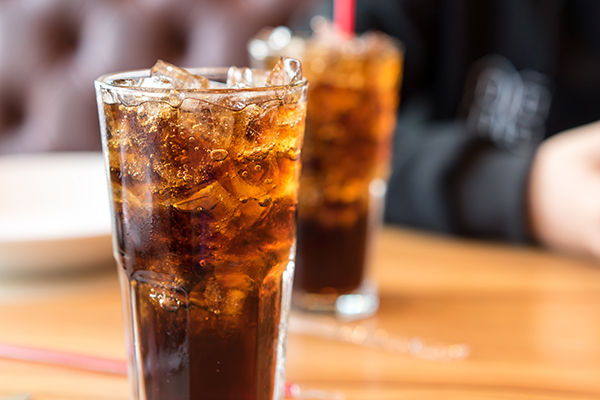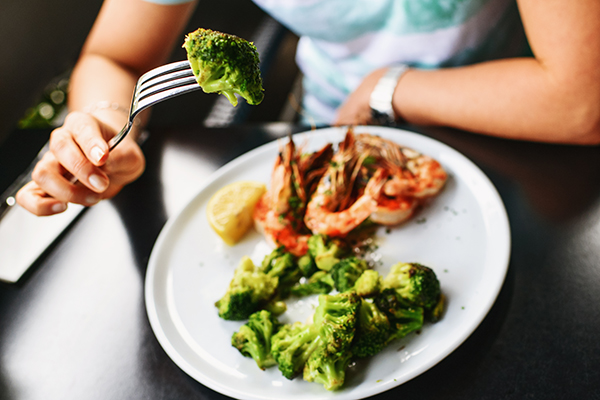8 Ways to Prevent Gas (or Stop It Once It Starts)

Let’s get this out of the way: Farting and burping are just part of being human.
In fact, it’s totally normal to pass gas anywhere from 13 to 21 times a day!
“Passing gas relieves bloating — that’s a good thing,” says Libby Mills, M.S., R.D., L.D.N., FAND, a registered dietitian and spokesperson for the Academy of Nutrition and Dietetics.
But it can be uncomfortable (and sometimes embarrassing) so it’s only natural to want to know how to prevent gas whenever possible.
Follow these tips to help alleviate or avoid some of yours, whether it comes from up top or behind.
1. Eat slower
“Gas in the stomach is most likely caused by swallowing air when eating and drinking,” says Mills.
So when you eat fast, more air gets in — especially when you’re drinking or eating on the go. Slow down and chew your food to avoid feeling gassy later.

2. Nix gum, candy, and cigarettes
Chewing gum or sucking on hard candies increases the amount of air you swallow, so cutting down can help reduce the gas that comes with it.
Plus, they often contain sweeteners linked to bloating. Artificial sugars and sugar alcohols, like sucralose, sorbitol, xylitol, and mannitol, are all safe to consume.
But many are FODMAPs (fermentable oligosaccharides, disaccharides, monosaccharides, and polyols) that cannot be digested and can produce gas.
And if you’re a smoker, that habit can significantly impact GI health. You inhale excess air with every puff of a cigarette or vape, leading to bloating.

3. Cut back on carbonation
Soda, beer, and sparkling water get their fizziness from carbon dioxide. As a gas, carbon dioxide has to go somewhere after you drink it, which can cause you to either pass gas or burp.
Carbonated water and other drinks are tasty ways to stay hydrated, but you might want to cut back on them if you’re feeling gassy after sipping seltzer.
4. Focus on fiber
As great as fiber is for our health, it can also cause gas. “Bacteria in the large intestine ferments carbohydrates and fiber, and this fermentation is essential for human health,” says Caitlin Self, M.S., C.N.S., L.D.N., a registered dietitian and blogger.
But when they move to the small intestine, the gas they produce “can cause significant gas, bloating, distention, and discomfort,” she says.
Inulin, a prebiotic fiber found in foods like chicory root, asparagus, bananas, and more, is also known to cause gas in larger quantities, says Mills.
Cut back if you feel gassy.

5. Know which foods cause gas
Many healthy foods can cause gas, even though they offer plenty of nutritional benefits.
Lactose, a type of sugar found in dairy products like cheese and milk, can also cause gas in people who don’t naturally produce enough lactase, an enzyme that helps the body digest lactose.
Lactose intolerance can also cause bloating, diarrhea, and more.
And if you feel like loading up on vegetables makes you more… musical, you aren’t imagining it.
“Vegetables like broccoli, cabbage, cauliflower, and Brussels sprouts contain an indigestible sugar called raffinose,” says Mills.
Eat less of them if they cause problems, and be sure to chew every bite.
“Experiencing excessive gas after eating fruits, vegetables, and whole grains may mean that you need to cut back temporarily,” explains Mills. “You can gradually increase these healthful foods, which may give your gut bacteria a chance to adjust.”
6. Try an elimination diet
Not sure what’s giving you gas? Consider going on an elimination diet, such as Ultimate Reset, that takes certain foods out of your diet for a while before adding them back in.
You can also talk to your doctor about elimination diets if you suspect an intolerance or allergy.
7. Get rid of gas when it starts
While eliminating certain foods from your diet can help you prevent gas, what about getting rid of gas in the moment?
Over-the-counter products like antacids or anti-gas capsules can help.
You can also try drinking 1/2 teaspoon of baking soda mixed into 1/2 cup of water, says Mills, which can “help cause burping and relieve built-up gas. For most people, this is a safe remedy.”
When taken before or with a meal, enzyme-based supplements like Beano and Lactaid also help alleviate gas caused by certain foods by breaking down gas-producing bacteria.
8. Check with your doctor
While some gas is a fact of life, do talk to your doctor if yours doesn’t go away.
Very smelly gas, increased frequency, and gas pains might be a symptom of something beyond normal gas, says Mills.
